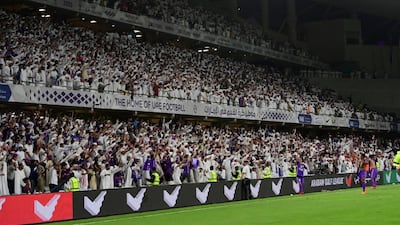Al Ain midfielder Hussein El Shahat has said the club’s “loyal fans” will help drive their bid for success when the Arabian Gulf League champions take part in the 2018 Fifa Club World Cup in the UAE.
As champions of the domestic league, Al Ain have earned their place in the December 12-22 tournament, where the winners of each continental competition will vie for the right to be named world champions.
The Garden City club will be joined in the UAE by Uefa Champions League winners Real Madrid, Concacaf winners Guadalajara, and OFC champions Wellington.
The representatives for Asia (AFC), Africa (CAF), and South America (Conmebol) will be confirmed in November.
___________
Read more:
Hussein El Shahat confirms commitment to Al Ain amid Al Ahly reports
UAE hailed as 'the perfect host' as 2019 Asian Cup tickets go on sale
When is the 2018 Fifa Club World Cup? All you need to know about the UAE tournament
___________
The matches will be held at Zayed Sports City Stadium in Abu Dhabi and at Al Ain’s Hazza Bin Zayed Stadium, and Shahat is confident home advantage can play its part.
“It will be great playing in front of our home fans in Al Ain – they always support us home and away,” the 26-year-old Egyptian said.
“It makes a huge difference to us as players to know we have this unwavering support from our loyal fans.
“We have great fans that support the team throughout the year, and this will give us huge support and a big boost in the tournament. Our fans are the best in the UAE, but we hope all UAE fans will support us because we are playing for all of the Emirates.”
Playing in front of home fans seemed to boost rivals Al Jazira last year when, as UAE champions, they took part in the 2017 Club World Cup.
Jazira went on to reach the semi-finals before narrowly losing 2-1 to Real Madrid, having held the lead before Gareth Bale scored the winner with nine minutes remaining.
Al Ain manager Zoran Mamic echoed El Shahat’s sentiments and believes the club’s supporters can inspire his players.
“For the country and football fans in the Emirates it is a big thing to see these international players in the flesh,” Mamic said from Al Ain’s training camp in Slovenia where they are preparing for the Arabian Super Cup against Al Wahda in Cairo on August 25. “But we know our loyal fans will create an atmosphere that drives our players to perform above and beyond themselves.”
Al Ain chairman Ghanem Mubarak Al Hejari agreed with El Shahat and Mamic and is looking forward to watching his team test their abilities against some of the best sides in the world.
“There will be world-class clubs playing in this competition and we will stand together and show the same strength that saw us win the double this season,” he said.
“The world will see how the sons of the desert perform. Al Ain fans and the UAE in general love their sport, love their football and I know they will be looking forward to December 12 when the tournament starts – home support will be key to our hopes.”

